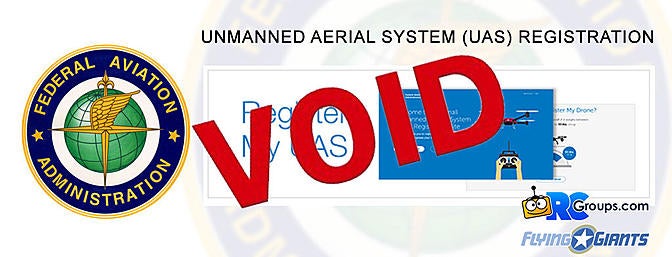 |
| John Taylor and one of the drones he custom built |
In a stunning David versus Goliath case, John A. Taylor, a model aircraft enthusiast and insurance lawyer, beat the Federal Aviation Administration and Department of Justice in a case challenging the legality of a December 2015 FAA rule requiring model aircraft to register like manned aircraft. The Court of Appeals for the District of Columbia ruled that the FAA's registration rule, as it applies to model aircraft, "directly violates [a] clear statutory prohibition."
How a little-known insurance lawyer became a symbol of (drone) liberty - Technical.ly DC
Federal Appeals Court: The FAA's Registration Rule Violates Section 336
Today, the Federal Appeals Court of the District of Columbia rules that drone and hobby model aircraft registration did violate the FAA Modernization and Reform Act of 2012 (section 336), and rendered it void. This is a huge victory for hobby model aircraft pilots that were forced to comply with FAA regulations or face stiff penalties. Is this the end of this dark chapter in model aviation? One would hope, but given the FAA propensity of fighting hobby model aircraft and their pilots, the Federal Aviation Administration may retaliate in some manner.
SEC. 336. <> SPECIAL RULE FOR MODEL
AIRCRAFT.
(a) In General.--Notwithstanding any other provision of law relating
to the incorporation of unmanned aircraft systems into Federal Aviation
Administration plans and policies, including this subtitle, the
Administrator of the Federal Aviation Administration may not promulgate
any rule or regulation regarding a model aircraft, or an aircraft being
developed as a model aircraft, if--
(1) the aircraft is flown strictly for hobby or recreational
use;
(2) the aircraft is operated in accordance with a community-
based set of safety guidelines and within the programming of a
nationwide community-based organization;
(3) the aircraft is limited to not more than 55 pounds
unless otherwise certified through a design, construction,
inspection, flight test, and operational safety program
administered by a community-based organization;
(4) the aircraft is operated in a manner that does not
interfere with and gives way to any manned aircraft; and
(5) when flown within 5 miles of an airport, the operator of
the aircraft provides the airport operator and the airport air
traffic control tower (when an air traffic facility is located
at the airport) with prior notice of the operation (model
aircraft operators flying from a permanent location within 5
miles of an airport should establish a mutually-agreed upon
operating procedure with the airport operator and the airport
air traffic control tower (when an air traffic facility is
located at the airport)).
(b) Statutory Construction.--Nothing in this section shall be
construed to limit the authority of the Administrator to pursue
enforcement action against persons operating model aircraft who endanger
the safety of the national airspace system.
(c) Model Aircraft Defined.--In this section, the term ``model
aircraft'' means an unmanned aircraft that is--
(1) capable of sustained flight in the atmosphere;
[[Page 126 STAT. 78]]
(2) flown within visual line of sight of the person
operating the aircraft; and
(3) flown for hobby or recreational purposes.
TaylorFAAOpinion.pdf
The FAA’s Registration Rule violates Section 336 of the FAA Modernization and Reform Act. We grant Taylor’s petition for review of the Registration Rule, and we vacate the Registration Rule to the extent it applies to model aircraft.

Free Good Morning Images Wallpapers HD 2018
ReplyDeleteFree Good Morning Wallpapers Images For 2018
Free Good Morning Quotes, pics For 2018
Free Good Morning Wishes, pics For 2018